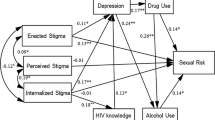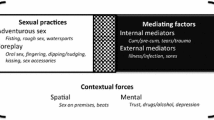Abstract
This study examines levels and correlates of internalized homophobia among men who have sex with men (MSM) in Pretoria, South Africa. Using respondent-driven sampling, we recruited 324 MSM from February to August 2009. Results were adjusted using RDSAT analysis to yield population-based estimates. High levels of internalized homophobia exist among South African MSM: 10–15% reported “often/very often” and over 20% reported “sometimes” having feelings of internalized homophobia. A greater level of internalized homophobia was significantly associated with a lower level of education [Adjusted Odds Ratio = 2.2; 95% CI = 1.1–4.9], a higher level of HIV misinformation [AOR = 2.7; 95% CI: 1.3–5.3], bisexual identity (vs. homosexual) [AOR = 5.5; 95% CI: 2.5–12.0], and HIV-related conspiracy beliefs [AOR = 2.4; 95% CI: 1.02–5.8]. These findings contribute valuable information to our understanding of internalized homophobia in South Africa, highlighting the need to empower the gay community, promote self-acceptance of homosexual identity, and address conspiracy beliefs among MSM to reduce internalized homophobia and increase access to HIV prevention interventions.
Similar content being viewed by others
References
UNAIDS. AIDS epidemic update 2010. Geneva: UNAIDS; 2010. ISBN 978-92-9173-871-7.
Rispel LC, Metcalf CA. Breaking the silence: South African HIV policies and the needs of men who have sex with men. Reprod Health Matters. 2009;17(33):133–42.
Baral S, Sifakis F, Cleghorn F, Beyrer C. Elevated risk for HIV infection among men who have sex with men in low- and middle-income countries 2000–2006: a systematic review. PLoS Med. 2007;4(12):e339.
Smith AD, Tapsoba P, Peshu N, Sanders EJ, Jaffe HW. Men who have sex with men and HIV/AIDS in sub-saharan Africa. Lancet. 2009;374(9687):416–22. Aug 1.
Lane T, Mogale T, Struthers H, McIntyre J, Kegeles SM. “They see you as a different thing”: the experiences of men who have sex with men with healthcare workers in South African township communities. Sex Transm Infect. 2008;84(6):430–3.
Petros G, Airhihenbuwa CO, Simbayi L, Ramlagan S, Brown B. HIV/AIDS and ‘othering’ in South Africa: the blame goes on. Cult Health Sex. 2006;8(1):67–77. Jan–Feb.
Skinner D, Mfecane S. Stigma, discrimination and the implications for people living with HIV/AIDS in South Africa. SAHARA J. 2004;1(3):157–64.
Meyer IH, Dean L. Patterns of sexual behavior and risk taking among young New York city gay men. AIDS Educ Prev. 1995;7(Suppl 5):13–23.
Brooks-Gunn J, Garber J. What’s sex got to do with it? The development of sexual identities during adolescence. London: Oxford University Press; 1999.
Herek GM. Beyond “homophobia”: a social psychological perspective on attitudes toward lesbians and gay men. J Homosex. 1984;10(1–2):1–21. Fall.
Cass VC. Homosexual identity formation: a theoretical model. J Homosex. 1979;4(3):219–35. Spring.
Meyer IH. Minority stress and mental health in gay men. J Health Soc Behav. 1995;36(1):38–56.
Kalichman SC, Simbayi L. Traditional beliefs about the cause of AIDS and AIDS-related stigma in South Africa. AIDS Care. 2004;16(5):572–80.
Newcomb ME, Mustanski B. Internalized homophobia and internalizing mental health problems: a meta-analytic review. Clin Psychol Rev. 2010;30(8):1019–29.
Ross MW, Rosser BR. Measurement and correlates of internalized homophobia: a factor analytic study. J Clin Psychol. 1996;52(1):15–21.
Nicholson WD, Long BC. Self-esteem, social support, internalized homophobia, and coping strategies of HIV + gay men. J Consult Clin Psychol. 1990;58(6):873–6.
Ross MW, Rosser BR, Neumaier ER. The relationship of internalized homonegativity to unsafe sexual behavior in HIV-seropositive men who have sex with men. AIDS Educ Prev. 2008;20(6):547–57.
Newcomb ME, Mustanski B. Moderators of the relationship between internalized homophobia and risky sexual behavior in men who have sex with men: a meta-analysis. Arch Sex Behav. 2011;40(1):189–99.
Kashubeck-West S, Szymanski D. Risky sexual behavior in gay and bisexual men internalized heterosexism, sensation seeking, and substance use. Couns Psychol. 2008;36(4):595–614.
Huebner DM, Davis MC, Nemeroff CJ, Aiken LS. The impact of internalized homophobia on HIV preventive interventions. Am J Community Psychol. 2002;30(3):327–48.
Tun W, Kellerman S, Maime S, Fipaza Z, Sheehy M, Vu L, et al. Conspiracy beliefs about HIV, attitudes towards condoms and treatment and HIV-related preventive behaviors among men who have sex with men in Tshwane (Pretoria), South Africa. [Unpublished manuscript]. 2010.
Heckathorn D. Respondent-driven sampling: a new approach to the study of hidden populations. Social Probl. 1997;44(3):174–99.
Heckathorn D. Respondent-driven sampling II: deriving valid population estimates from chain-referral samples of hidden populations. Social Probl. 2002;49(1):11–34.
Meyer I, Dean L. Internalized homophobia, intimacy and sexual behavior among gay and bisexual men. Thousand Oaks: Sage; 1998.
Bogart LM, Bird ST. Exploring the relationship of conspiracy beliefs about HIV/AIDS to sexual behaviors and attitudes among African-American adults. J Natl Med Assoc. 2003;95(11):1057–65.
Ross MW, Essien EJ, Torres I. Conspiracy beliefs about the origin of HIV/AIDS in four racial/ethnic groups. J Acquir Immune Defic Syndr. 2006;41(3):342–4.
Raymond HF, Kajubi P, Kamya MR, Rutherford GW, Mandel JS, McFarland W. Correlates of unprotected receptive anal intercourse among gay and bisexual men: Kampala, Uganda. AIDS Behav. 2009;13(4):677–81.
Lane T, Raymond HF, Dladla S, Rasethe J, Struthers H, McFarland W, et al. High HIV prevalence among men who have sex with men in Soweto, South Africa: results from the Soweto men’s study. AIDS Behav. 2011;15(3):626–34.
South Africa Educational Levels. 2005 [cited 2010 Oct 29]. http://www.southafrica.info/about/education/education.htm.
Allen DJ, Oleson T. Shame and internalized homophobia in gay men. J Homosex. 1999;37(3):33–43.
Johnson C. Off the map: how HIV/AIDS programming is failing same-sex practicing people in Africa. New York: International Gay and Lesbian Human Rights Commission; 2007.
Shidlo A. Internalized homophobia: conceptual and empirical issues in measurement. In: Greene B, Herek GM, editors. Lesbian and gay psychology: theory, research and clinical applications. Thousand Oaks, CA: Sage; 1994. p. 176–205.
Kaufman G. The psychology of shame: the theory and treatment of shame-based syndromes. 2nd ed. New York: Springer; 1996.
Maslow AH. A theory of human motivation. Psychol Rev. 1943;50(4):370–96.
Kendall C, Kerr LR, Gondim RC, Werneck GL, Macena RH, Pontes MK, et al. An empirical comparison of respondent-driven sampling, time location sampling, and snowball sampling for behavioral surveillance in men who have sex with men, Fortaleza, Brazil. AIDS Behav. 2008;12(Suppl 4):S97–104.
Malyon AK. Psychotherapeutic implications of internalized homophobia in gay men. J Homosex. 1981;7(2–3):59–69. Winter-Spring.
Acknowledgments
The authors would like to thank the men in Pretoria, South Africa for participating in the study and the American Foundation for AIDS Research for funding the study. The findings and recommendations of this study are those of the authors and do not necessarily reflect the views of the funder.
Author information
Authors and Affiliations
Corresponding author
Rights and permissions
About this article
Cite this article
Vu, L., Tun, W., Sheehy, M. et al. Levels and Correlates of Internalized Homophobia Among Men Who Have Sex with Men in Pretoria, South Africa. AIDS Behav 16, 717–723 (2012). https://doi.org/10.1007/s10461-011-9948-4
Published:
Issue Date:
DOI: https://doi.org/10.1007/s10461-011-9948-4




